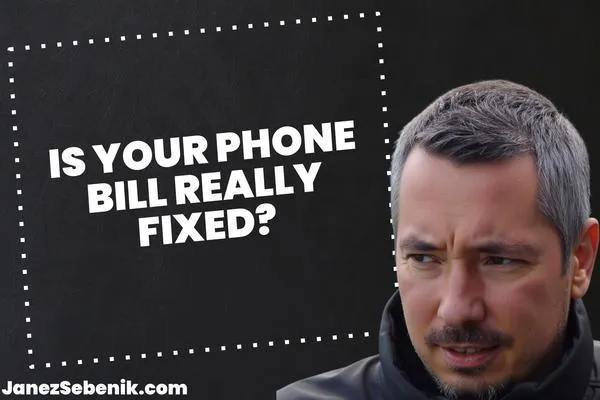
Is a cell phone bill a fixed expense?
You're sitting there, staring at your phone bill, wondering if it's a fixed expense. Well, let me break it down for you.
A cell phone bill is typically a fixed expense because it stays the same each month. You know exactly how much you'll be shelling out when that bill rolls around.
It's like clockwork, right?
But hold up. There's a twist. Sometimes your cell phone bill can be a bit of a wild card. Maybe you went over your data limit or made some international calls. In those cases, your bill might jump up.
So while it's usually fixed, it can have its moments of surprise.
Key Takeaways
Cell phone bills are generally considered fixed expenses due to their consistent monthly cost
Understanding the difference between fixed and variable expenses helps in better budget planning
Regular review of your cell phone plan can lead to potential savings on this recurring expense
Understanding Fixed Expenses
Fixed expenses are like the foundation of your budget. They're the bills you can count on showing up every month, rain or shine. Let's break it down.
Defining Fixed Expenses
Fixed expenses are the costs that stay the same month after month. They're the predictable ones, the ones you can set your watch by. These are expenses you can expect to stay the same over time.
Think of them as your financial constants. They don't change based on your spending habits or lifestyle choices. They're just there, waiting for you to pay them.
Fixed expenses are usually tied to contracts or agreements. You know exactly how much you'll need to fork over each month. This predictability makes them easier to plan for in your budget.
Common Examples of Fixed Expenses
Let's talk about some fixed expenses you're probably familiar with:
Rent or mortgage payments
Car loan payments
Student loan payments
Insurance premiums (health, car, life)
Property taxes
Cell phone bills
These are the bills that keep a roof over your head and keep you moving. They're the non-negotiables in your financial life.
Some fixed expenses might pop up less often, like annual subscriptions or quarterly insurance payments. But they're still fixed because you know the amount and when they're due.
Remember, just because they're fixed doesn't mean they can't change ever. Your rent might go up when you renew your lease. But for the duration of your agreement, it stays the same.
Variable Expenses Explained
Money comes in, money goes out. But not all expenses are created equal. Let's dive into the world of variable expenses - the costs that keep you on your toes.
Defining Variable Expenses
Variable expenses are the wild cards in your budget. They're like that friend who shows up unannounced - sometimes they're a blast, other times they drain your wallet.
Variable expenses can change from month to month. They depend on your choices and lifestyle. Think of them as the fun (or not-so-fun) stuff you spend money on.
You have more control over these costs. Want to save cash? Tweak your variable expenses. It's like turning down the volume on your spending.
Typical Variable Expenses
Now, let's talk about where your money's actually going. These are the usual suspects in the variable expense lineup:
Groceries: Gotta eat, right? But how much you spend can vary.
Gas: Prices go up, prices go down. Your mileage may vary (literally).
Dining out: From fancy steaks to late-night tacos, it all adds up.
Entertainment: Movies, concerts, that new video game you "had to have".
Clothing: Because sometimes you need new kicks.
Personal care: Haircuts, gym memberships, that fancy face cream.
These costs can make or break your budget. They're the first place to look when you need to tighten your belt. But they're also where the fun happens.
Remember, your variable expenses are like a financial playground. You've got the power to decide where your money goes. Use it wisely, and you might just find some extra cash in your pocket.
Budgeting Basics
Money management isn't rocket science. It's about knowing where your cash goes and making smart choices. Let's break it down.
Crafting a Monthly Budget
Start by listing your income. Every penny counts. Now, jot down your expenses. Rent, groceries, cell phone bill - the works.
Use a budgeting app to make life easier. These tools can track your spending and give you a clear picture of where your money's going.
Set some financial goals. Want to save for a vacation? Build an emergency fund? Invest? Write it down.
Allocate your cash to different categories. Housing, food, transport - you know the drill. Don't forget savings. Pay yourself first, always.
Review your budget regularly. Life changes, and so should your budget. Stay flexible, but stay disciplined.
Evaluating Necessities vs. Luxuries
Time to separate needs from wants. Rent? Necessity. Latest iPhone? Probably not.
Necessities are non-negotiable. Food, shelter, utilities - you get the idea. Everything else? That's where you can cut back.
Look at your subscriptions. Netflix, gym membership, magazine subscriptions. Do you need them all? Be honest with yourself.
Hobbies and entertainment are important, but they shouldn't break the bank. Find cheaper alternatives. Free concerts instead of pricey shows.
Discretionary spending is your fun money. But remember, every dollar you save is a dollar towards your goals.
Be ruthless. If it doesn't add value to your life, cut it. Your future self will thank you.
Expense Management Strategies
Want to keep more cash in your pocket? Let's talk about how to slash those bills and boost your savings. It's all about being smart with your money.
Tips for Reducing Fixed Expenses
First up, let's tackle those pesky fixed expenses. You know, the ones that show up like clockwork every month. Start by negotiating your bills. Yep, you can do that!
Call up your service providers and ask for better rates. You'd be surprised how often they'll play ball.
Next, consider refinancing your loans. Lower interest rates mean lower monthly payments. Cha-ching!
Don't forget about insurance. Shop around and bundle policies to score some sweet discounts.
Lastly, take a hard look at your subscriptions. Do you really need all those streaming services? Be ruthless and cut what you don't use.
Ways to Cut Back on Variable Expenses
Now for the fun part - variable expenses. These are the ones you have more control over. Let's start with food. Eating out is a budget killer.
Try meal prepping instead. It's cheaper and healthier. Win-win!
When you do shop, use coupons and buy in bulk. Your wallet will thank you.
Transportation costs eating you alive? Carpool or use public transit when you can.
And here's a pro tip: learn some basic car maintenance. It'll save you big time in the long run.
Finally, get creative with your entertainment. Free local events, anyone? Your fun doesn't have to come with a hefty price tag.
Is a Cell Phone Bill a Fixed Expense?
You bet it is! A cell phone bill is as fixed as your grandma's dentures.
Think about it. Every month, like clockwork, that bill shows up. Same amount, same day. It's like a subscription to your favorite podcast, but way more expensive.
Your cell phone plan is part of the fixed expense club. It hangs out with rent, car payments, and Netflix subscriptions.
Here's the deal:
Fixed amount: You know exactly what you're paying
Regular timing: It's not playing hide and seek with your wallet
Predictable: Like your neighbor's loud music on Friday nights
When you're setting up your household budget, your cell phone bill is a VIP guest. It gets a reserved spot every single month.
But wait, there's a twist! Some folks might say, "What about data overages?" Good point, champ. But let's be real, most plans these days are unlimited. So unless you're living in 2010, your bill stays put.
Remember, fixed doesn't mean you can't change it. You can always:
Shop around for better deals
Negotiate with your provider
Cut back on unnecessary features
So there you have it. Your cell phone bill is as fixed as it gets in the world of monthly expenses. Now go crush that budget!
Financial Planning for the Future
Smart money moves today set you up for success tomorrow. Let's dive into how to make your cash work for you and keep those expenses in check.
Setting and Achieving Financial Goals
You gotta dream big, but plan smart. Start by writing down what you want. A house? Early retirement? Fancy vacations?
Now, break those big dreams into bite-sized goals. Want that house in 5 years? Figure out how much you need to save each month.
Set up automatic transfers to your savings account. It's like paying your future self first. Trust me, future you will be stoked.
Don't forget about that emergency fund. Aim for 3-6 months of expenses. It's your financial safety net when life throws curveballs.
Investing isn't just for Wall Street bros. Start small with index funds or robo-advisors. The magic of compound interest will blow your mind.
The Role of Expense Tracking
You can't improve what you don't measure. Tracking expenses is like a fitness tracker for your wallet.
Use a budgeting app to categorize your spending. It'll show you where your money's really going. Prepare for some surprises!
Review your monthly expenditures regularly. Look for patterns and areas to cut back. Small changes add up big time.
Challenge yourself to trim expenses in different categories each month. It's like a game, but the prize is cold, hard cash in your pocket.
Remember, it's not about depriving yourself. It's about spending on what truly matters to you. Cut ruthlessly on things you don't care about, so you can splurge guilt-free on what you love.
Additional Considerations
Cell phone bills aren't as simple as they seem. Let's dive into some key factors that can impact your budget and financial choices.
Periodic and Essential Expenses
Your cell phone bill? It's not alone. Think about other bills that pop up regularly:
Rent or mortgage payments
Utility bills (electricity, water, gas)
Property taxes
Medical bills
These are all essential expenses. They keep a roof over your head and the lights on. You can't just cut them out.
But here's the thing: some of these costs might change. Your cell phone bill? Usually stays the same. Your electric bill? Might spike in summer.
Lifestyle Choices and Their Impact
Now, let's talk about how you live. Your choices? They matter.
Want to save money? Look at your cell phone plan. Maybe you don't need unlimited data. Or that fancy new phone every year.
Other areas to consider:
Entertainment (Netflix, anyone?)
Travel (weekend getaways add up)
Hobbies (golf clubs aren't cheap)
These aren't must-haves. But they make life fun. The trick? Balance. Find joy without breaking the bank.
Seeking Professional Advice
Feeling overwhelmed? Don't sweat it. Sometimes, you need a pro.
A financial advisor can help you:
Sort out necessary vs. discretionary spending
Plan for big expenses (like medical bills)
Set realistic financial goals
They might even find ways to deduct your cell phone expenses if you use it for work. Cool, right?
Remember, it's your money. You work hard for it. Make it work hard for you.
